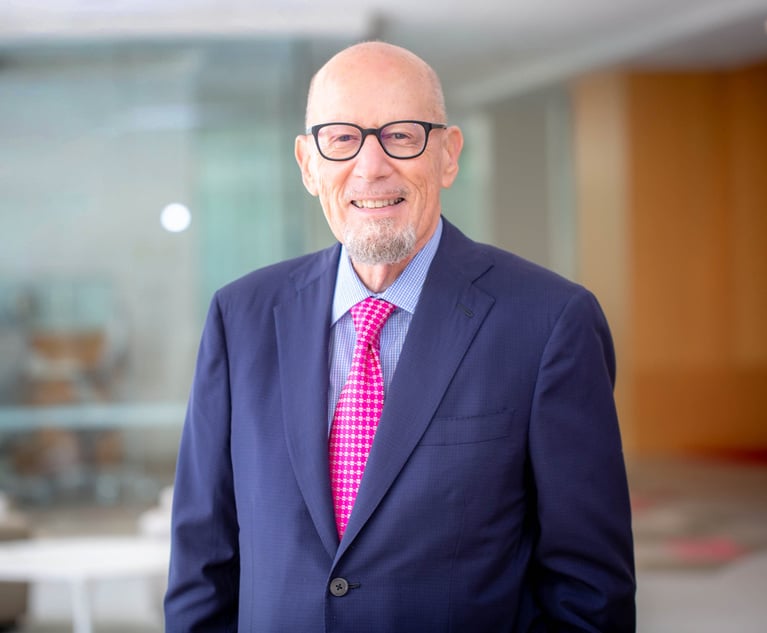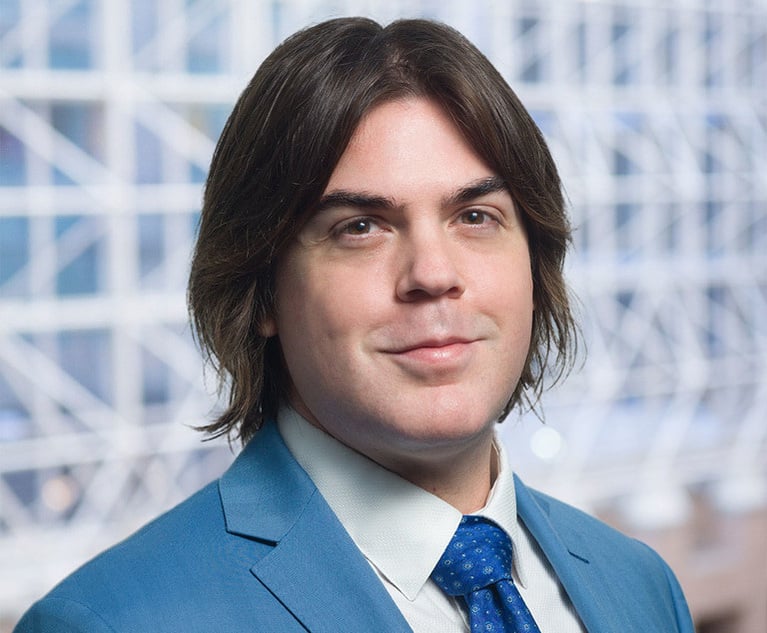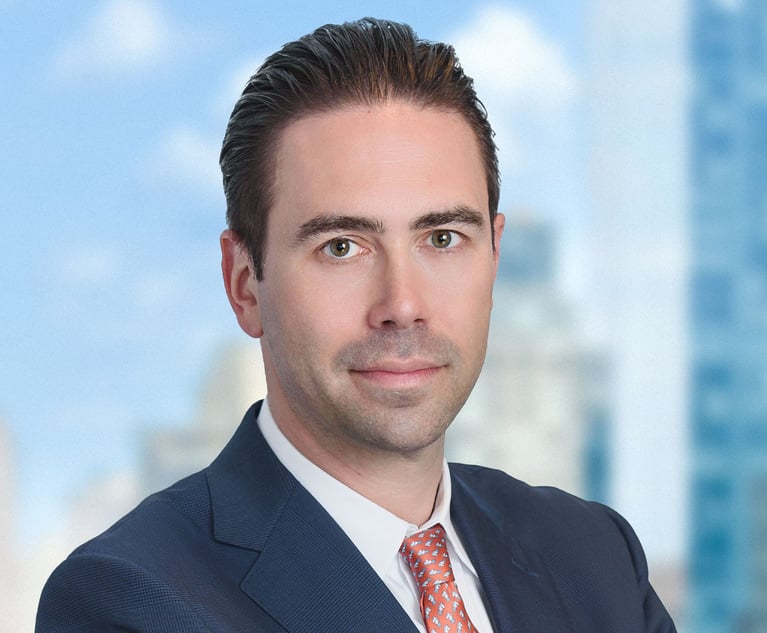Q&A: Courtney Capute on the Power of Respect
The head of Venable's Baltimore office on women in leadership roles and taking advantage of opportunities.
February 28, 2018 at 06:30 PM
6 minute read

Editor's note: This is part of a series of Q&As with leading women in the legal profession, in honor of National Women's History Month. They were conducted and written by the law firm recruiting company Major, Lindsey & Africa.
Courtney Capute, partner in charge in Venable's Baltimore office, has spent her entire career at the firm. She started in the real estate practice group and found a home there. Transactional law fit her skill set and personality, particularly after she came to appreciate how real property and zoning issues could drive the development of a neighborhood when she and her husband purchased a rowhouse in Baltimore's Fells Point. She became a nonequity partner in 1996 and converted to equity partner shortly thereafter. Her practice is multifaceted; she represents hotel brands and other businesses in the acquisition and sale of hotel properties and in the negotiation of their hotel management agreements. She also represents CMBS special services lenders in loan restructurings and defaults. She is a member of the Venable Expansion Committee and co-chairs Venable's Hospitality Industry Sector Initiative.
Who helped you the most on your career path?
Jim Wright, my former practice group chair, helped me most. Working with someone of his experience, caliber and character was invaluable to me. Jim showed me the importance of valuing and respecting everyone's contributions. He was skilled at taking the long view and putting each member of our team in a position to succeed, and as a result, Jim generated loyalty and inspired people to do their best work. His philosophy had nothing to do with gender; it was about respecting people for what they brought to the table. As a result, Jim created a collaborative atmosphere.
Were there any moments early in your career that surprised you in terms of how you were treated? What struggles did you encounter and how did you overcome those roadblocks in your career?
I've been fortunate in my career; I have not been confronted with gender-related roadblocks, and I don't think the challenges I've faced were different from those encountered by any working parent, man or woman. Everyone has responsibilities to other people in their lives and those responsibilities place demands on one's time. I'm fortunate to have a very supportive spouse who celebrates my successes. Needless to say, law is a demanding career, and beyond that, the challenges can be self-imposed. You've got to take ownership and figure out how you are going to accomplish your objectives. Being self-aware is important because it will help you to better understand your strengths and overcome your weaknesses.
Throughout my career, I have been given opportunities to serve on committees and to prove myself. Moments that surprised me had more to do with the level of responsibility I was given, which was both empowering and, at times, terrifying, but it taught me a lot. One of the challenges of a large law firm is making sure we recognize the skills as well as the weaknesses of our young lawyers so we tap into their tremendous potential and put them in a position to succeed. The percentage of lifers at Venable really speaks to that; my own experience at this firm has always been positive.
What has been your greatest challenge as the partner in charge of the Baltimore office?
My greatest challenge as the partner in charge of Venable's Baltimore office is to find ways to encourage greater community engagement and to actively promote our office and our capabilities while still maintaining my practice. What's been nice for me is that at this point in my career, this leadership position draws on a different skill set. It presents a whole new set of challenges that are different from representing clients. I am always trying to figure out ways to encourage greater engagement between our young attorneys in the legal community and the community at large.
We actively encourage nonprofit board participation and currently have Baltimore attorneys who are on more than 120 boards in the community. My personal participation on boards has been incredibly satisfying. For example, my work with Turn Around Inc., an organization that counsels survivors of sexual assault and domestic violence, has been very gratifying. My experience has been that with almost any nonprofit work, you feel great about the difference you are making and walk away with skills you wouldn't have had otherwise.
How important is it to Venable to have women in leadership?
Very important. Whether it is gender or ethnic diversity, everyone brings a different perspective to the table, which is critical to any organization. You can create a better outcome if you have more perspectives in the mix to get you there. And the importance of having role models should not be underestimated.
Because the advancement of women in leadership positions is of great importance to Venable, we formed an affinity group called WAVe (Women Attorneys at Venable), which is a diverse group of women attorneys and firm professionals whose mission is to improve the rate of retention, promotion and advancement of women attorneys within the firm and to increase the number and strength of women attorney applicants. What's more, since 2015, Venable has been a member of the prestigious Women in Law Empowerment Forum, a national group “dedicated to assisting women in law to assume leadership roles within the NLJ 250 and Fortune 1000 legal departments and within their respective communities.”
How do you or your organization help women advance in the workplace and the legal profession?
First, I respect the individual, whether man or woman. I try to be attentive to what's going on and make sure everyone is treated fairly and that skill sets aren't being overlooked—I strive to match skill sets with tasks. And where people do not have an advocate, I try to be one.
Second, within the organization, our WAVe program is terrific, and I enthusiastically support the group's efforts. It's valuable for women in the organization and helps them navigate situations by heightened self-awareness.
What advice would you give to young lawyers who desire to become a partner in a law firm?
Grab every opportunity that comes your way. You still have to set priorities and stick with them, but it's really about taking advantage of prospects that are put before you or that you've created for yourself. Understand from the outset what it takes to succeed as a lawyer; figure out what it takes to be a partner and pursue that goal.
This content has been archived. It is available through our partners, LexisNexis® and Bloomberg Law.
To view this content, please continue to their sites.
Not a Lexis Subscriber?
Subscribe Now
Not a Bloomberg Law Subscriber?
Subscribe Now
NOT FOR REPRINT
© 2025 ALM Global, LLC, All Rights Reserved. Request academic re-use from www.copyright.com. All other uses, submit a request to [email protected]. For more information visit Asset & Logo Licensing.
You Might Like
View All
Cozen O'Connor's Bernard Nash Pioneered the Modern State AGs Practice. Now He's Hanging Up His Boots
6 minute read
'Digital Mindset': Hogan Lovells' New Global Managing Partner for Digitalization

Quiet Retirement Meets Resounding Win: Quinn Emanuel Name Partner Kathleen Sullivan's Vimeo Victory

Can a Law Firm Institutionalize Its Culture? Boies Schiller’s New Chairman Will Try
Trending Stories
- 1Uber Files RICO Suit Against Plaintiff-Side Firms Alleging Fraudulent Injury Claims
- 2The Law Firm Disrupted: Scrutinizing the Elephant More Than the Mouse
- 3Inherent Diminished Value Damages Unavailable to 3rd-Party Claimants, Court Says
- 4Pa. Defense Firm Sued by Client Over Ex-Eagles Player's $43.5M Med Mal Win
- 5Losses Mount at Morris Manning, but Departing Ex-Chair Stays Bullish About His Old Firm's Future
Who Got The Work
J. Brugh Lower of Gibbons has entered an appearance for industrial equipment supplier Devco Corporation in a pending trademark infringement lawsuit. The suit, accusing the defendant of selling knock-off Graco products, was filed Dec. 18 in New Jersey District Court by Rivkin Radler on behalf of Graco Inc. and Graco Minnesota. The case, assigned to U.S. District Judge Zahid N. Quraishi, is 3:24-cv-11294, Graco Inc. et al v. Devco Corporation.
Who Got The Work
Rebecca Maller-Stein and Kent A. Yalowitz of Arnold & Porter Kaye Scholer have entered their appearances for Hanaco Venture Capital and its executives, Lior Prosor and David Frankel, in a pending securities lawsuit. The action, filed on Dec. 24 in New York Southern District Court by Zell, Aron & Co. on behalf of Goldeneye Advisors, accuses the defendants of negligently and fraudulently managing the plaintiff's $1 million investment. The case, assigned to U.S. District Judge Vernon S. Broderick, is 1:24-cv-09918, Goldeneye Advisors, LLC v. Hanaco Venture Capital, Ltd. et al.
Who Got The Work
Attorneys from A&O Shearman has stepped in as defense counsel for Toronto-Dominion Bank and other defendants in a pending securities class action. The suit, filed Dec. 11 in New York Southern District Court by Bleichmar Fonti & Auld, accuses the defendants of concealing the bank's 'pervasive' deficiencies in regards to its compliance with the Bank Secrecy Act and the quality of its anti-money laundering controls. The case, assigned to U.S. District Judge Arun Subramanian, is 1:24-cv-09445, Gonzalez v. The Toronto-Dominion Bank et al.
Who Got The Work
Crown Castle International, a Pennsylvania company providing shared communications infrastructure, has turned to Luke D. Wolf of Gordon Rees Scully Mansukhani to fend off a pending breach-of-contract lawsuit. The court action, filed Nov. 25 in Michigan Eastern District Court by Hooper Hathaway PC on behalf of The Town Residences LLC, accuses Crown Castle of failing to transfer approximately $30,000 in utility payments from T-Mobile in breach of a roof-top lease and assignment agreement. The case, assigned to U.S. District Judge Susan K. Declercq, is 2:24-cv-13131, The Town Residences LLC v. T-Mobile US, Inc. et al.
Who Got The Work
Wilfred P. Coronato and Daniel M. Schwartz of McCarter & English have stepped in as defense counsel to Electrolux Home Products Inc. in a pending product liability lawsuit. The court action, filed Nov. 26 in New York Eastern District Court by Poulos Lopiccolo PC and Nagel Rice LLP on behalf of David Stern, alleges that the defendant's refrigerators’ drawers and shelving repeatedly break and fall apart within months after purchase. The case, assigned to U.S. District Judge Joan M. Azrack, is 2:24-cv-08204, Stern v. Electrolux Home Products, Inc.
Featured Firms
Law Offices of Gary Martin Hays & Associates, P.C.
(470) 294-1674
Law Offices of Mark E. Salomone
(857) 444-6468
Smith & Hassler
(713) 739-1250










